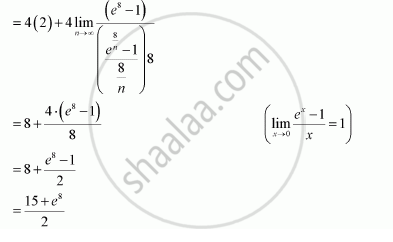Advertisements
Advertisements
Question
Evaluate the following definite integrals as limit of sums.
`int_0^4 (x + e^(2x)) dx`
Solution


APPEARS IN
RELATED QUESTIONS
Evaluate `int_(-1)^2(e^3x+7x-5)dx` as a limit of sums
Evaluate the following definite integrals as limit of sums `int_(-1)^1 e^x dx`
Evaluate the definite integral:
`int_0^(pi/4) (sinx cos x)/(cos^4 x + sin^4 x)`dx
Evaluate the definite integral:
`int_0^1 dx/(sqrt(1+x) - sqrtx)`
Evaluate the definite integral:
`int_0^(pi/2) sin 2x tan^(-1) (sinx) dx`
Prove the following:
`int_1^3 dx/(x^2(x +1)) = 2/3 + log 2/3`
Prove the following:
`int_0^1 xe^x dx = 1`
Prove the following:
`int_(-1)^1 x^17 cos^4 xdx = 0`
Prove the following:
`int_0^(pi/4) 2 tan^3 xdx = 1 - log 2`
Evaluate : `int_1^3 (x^2 + 3x + e^x) dx` as the limit of the sum.
\[\int\limits_0^1 \left( x e^x + \cos\frac{\pi x}{4} \right) dx\]
\[\int\frac{\sqrt{\tan x}}{\sin x \cos x} dx\]
Solve: (x2 – yx2) dy + (y2 + xy2) dx = 0
Evaluate the following as limit of sum:
`int_0^2 "e"^x "d"x`
Evaluate the following:
`int_0^2 ("d"x)/("e"^x + "e"^-x)`
Evaluate the following:
`int_0^pi x sin x cos^2x "d"x`
Evaluate the following:
`int_0^(1/2) ("d"x)/((1 + x^2)sqrt(1 - x^2))` (Hint: Let x = sin θ)
Evaluate the following:
`int_(pi/3)^(pi/2) sqrt(1 + cosx)/(1 - cos x)^(5/2) "d"x`
The value of `int_(-pi)^pi sin^3x cos^2x "d"x` is ______.
The value of `lim_(x -> 0) [(d/(dx) int_0^(x^2) sec^2 xdx),(d/(dx) (x sin x))]` is equal to
If f" = C, C ≠ 0, where C is a constant, then the value of `lim_(x -> 0) (f(x) - 2f (2x) + 3f (3x))/x^2` is
Let f: (0,2)→R be defined as f(x) = `log_2(1 + tan((πx)/4))`. Then, `lim_(n→∞) 2/n(f(1/n) + f(2/n) + ... + f(1))` is equal to ______.
`lim_(n rightarrow ∞)1/2^n [1/sqrt(1 - 1/2^n) + 1/sqrt(1 - 2/2^n) + 1/sqrt(1 - 3/2^n) + ...... + 1/sqrt(1 - (2^n - 1)/2^n)]` is equal to ______.
